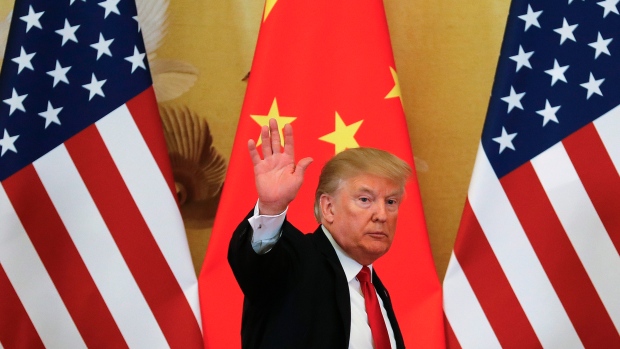Apr 5, 2018
Trump proposes US$100B more in China tariffs in response to 'unfair retaliation'
, Bloomberg News

President Donald Trump said Thursday he is ordering the U.S. Trade Representative to consider US$100 billion in additional tariffs on Chinese goods, ratcheting up tensions with Beijing after his administration signaled it would be willing negotiate.
U.S. stock futures dropped on Trump’s latest trade directive. S&P 500 Index futures slid as much as 1.2 per cent, after the underlying gauge ended up 0.7 per cent on Thursday.
“In light of China’s unfair retaliation, I have instructed the USTR to consider whether $100 billion of additional tariffs would be appropriate under section 301 and, if so, to identify the products upon which to impose such tariffs,” Trump said in a statement issued by the White House.
The move threatens to unravel efforts by top U.S. and Chinese trade officials to lower the heat and reach an agreement that could stave off a full-blown trade war that could harm the world’s two largest economies.
China said Wednesday it would levy a 25 per cent tariff on about US$50 billion of U.S. imports including soybeans, automobiles, chemicals and aircraft. That was in response to the release by the U.S. of a list of proposed tariffs a day earlier, covering US$50 billion in Chinese goods.
U.S. Trade Representative Robert Lighthizer quickly followed up Trump’s Thursday evening declaration with a statement of his own stressing that none of the tariffs would take immediate effect. He said that any additional tariffs first would be subject to a 60-day public comment period, as would the penalties announced earlier in the week.
“No tariffs will go into effect until the respective process is complete,” Litghhizer said.
Trump chief economic adviser Larry Kudlow and other administration officials have spent the past two days trying to tamp down fears of a trade war.
“I think we’re going to come to agreements,” Kudlow said Wednesday on Fox News. “I believe that the Chinese will back down and will play ball.”
Yet Trump signaled a harder line in a speech earlier Thursday, saying it is time to stop China from “taking advantage” of America.
‘FANTASTIC RELATIONSHIP’
“You have to go after the people who aren’t treating you right,” Trump said in West Virginia. “We’re going to have a fantastic relationship long term with China but we have to get this straightened out, we have to have some balance.”
Kudlow, his newly installed economic adviser, has spent days trying to calm investors who are concerned the spat will spark a trade war, saying on Thursday the administration was involved in “delicate negotiations” that might forestall the need for tariffs. He said the U.S. could still hammer out a deal with Beijing, in part by convincing other major economies to call out the Asian nation for unfair trading practices.
David Loevinger, a former senior Treasury official who is now managing director of emerging markets at TCW Group Inc., said the move casts doubt on the direction of U.S. policy
“It’s just not clear what the connection is right now between what the president says and what will actually become policy,” Loevinger said. “Markets increasingly have to discount White House statements on trade issues.”
